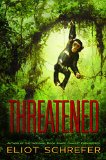Summary | Excerpt | Reviews | Beyond the Book | Readalikes | Genres & Themes | Author Bio

ONE
FRANCEVILLE, GABON
I'd never seen a mock man until the Professor showed me one. I'd heard them, of course — many evenings the chimpanzees would scream within the dark trees surrounding my village, their cries too strange for a person and too intimate for an animal. I still hear those shrieks, these years later. Whenever they got too loud, my mother and I would huddle on the floor of our hut, her arms wrapped tight around me. "This is why you must promise always to be home before dark, Luc," she would whisper. "If you're not, you'll become one of the kivili-chimpenze." The mock men.
I'd lean into the scratchy fabric of her boubou and wait for a hairy hand to come through the window. I'd imagine a lumpy head sniffing the air, black eyes staring into mine, lips pulling back from sharp teeth as the mock man lunged. I'd see us carried off into the jungle, one under each of the beast's arms.
My mother's warning worked; I was always home and at her side before dark.
Even when I was a little older and my village and my mother felt long in my past, I turned quiet and watchful at dusk. I would have loved to be safe in a home before the sky turned black. I just didn't have one to go to.
I worked long into the nights at the paillotte across from Franceville's best hotel, where the foreigners with their American dollars piled in after the day's train arrived. No one knew quite when that would be — the trains were always hours or days late. If one appeared to be arriving on time, it was probably from last week.
When I heard the whistle of a locomotive, I'd dash through Franceville's dusty streets to the Café de la Gare. There, beneath a string of naked lightbulbs, I would clean glasses, rubbing each with an old wet rag until the spit on the rim and the line of dried beer foam had merged and it could be filled again. I didn't get paid, but sometimes foreigners would leave me coins on the table and the lime twists at the bottoms of their drinks. Between coins and peels and the occasional snack swiped from the center market, I survived. At least I didn't have to rummage my food from the dump.
The city was loud at my back, but when I faced the trees all I could see were plastic tables tilting into the mud against the silhouette of the jungle. The streets were gone, the hospital was gone. Sometimes, when there were no more glasses for me to wipe, I'd stand at the forest line and listen under the music for the calls of the kivili-chimpenze, straining to hear the angry screams that said they'd once been men and now were not. I hadn't heard them since my mother had died, and I'd begun to wonder if the mock men had ever been out there, or if they'd been an illusion she'd conjured and the spell had died with her.
The night I met the Professor, a fleet of logging trucks had arrived at the same hour as the train, so I was very busy. It was all I could do to get the glasses wiped before they had to be filled and back out onto the tables. I worked hard and kept grinning, wiping sweat from my forehead with the ragged hem of my shirt. I'd smiled through all the bad moments of the past year: surfacing memories of my mother or sister; the times hunger's blade went from flat against my belly to jabbing its tip; the diarrhea I kept clenched inside my body until the bar closed and I could flee into the trees. I kept smiling because the bar owner could replace me at any time with one of Franceville's other street boys. I kept smiling because if I didn't have an occasional coin to bring home to Monsieur Tatagani to put toward my mother's debt, he would throw me out in the street. Or worse.
I didn't notice the Professor at first, not until he said the word chimpanzee. I thought right away of my mother's warnings about the mock men, and gaped at the man. He looked to be an Arab, at least forty years old, and was seated all by himself. I decided to clear the table next to him as an excuse to draw near. I expanded time by scrubbing hard, as if hoping to find a new and better plastic table beneath the surface.
Excerpted from Threatened by Eliot Schrefer. Copyright © 2014 by Eliot Schrefer. Excerpted by permission of Scholastic. All rights reserved. No part of this excerpt may be reproduced or reprinted without permission in writing from the publisher.
Heaven has no rage like love to hatred turned, Nor hell a fury like a woman scorned.
Click Here to find out who said this, as well as discovering other famous literary quotes!
Your guide toexceptional books
BookBrowse seeks out and recommends the best in contemporary fiction and nonfiction—books that not only engage and entertain but also deepen our understanding of ourselves and the world around us.